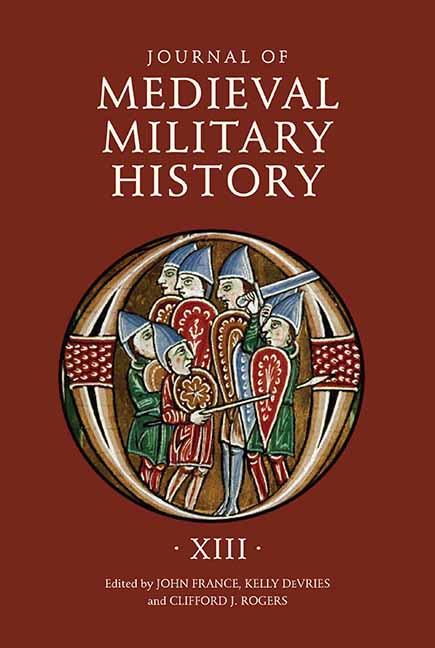7 results
List of Contributors
-
- Book:
- Journal of Medieval Military History
- Published by:
- Boydell & Brewer
- Published online:
- 25 May 2021
- Print publication:
- 15 October 2015, pp 277-280
-
- Chapter
- Export citation
De Re Militari and the Journal of Medieval Military History
-
- Book:
- Journal of Medieval Military History
- Published by:
- Boydell & Brewer
- Published online:
- 25 May 2021
- Print publication:
- 15 October 2015, pp 287-287
-
- Chapter
- Export citation
Frontmatter
-
- Book:
- Journal of Medieval Military History
- Published by:
- Boydell & Brewer
- Published online:
- 25 May 2021
- Print publication:
- 15 October 2015, pp i-iv
-
- Chapter
- Export citation
List of Illustrations and Table
-
- Book:
- Journal of Medieval Military History
- Published by:
- Boydell & Brewer
- Published online:
- 25 May 2021
- Print publication:
- 15 October 2015, pp vi-vi
-
- Chapter
- Export citation
Journal of Medieval Military History 1477–545X
-
- Book:
- Journal of Medieval Military History
- Published by:
- Boydell & Brewer
- Published online:
- 25 May 2021
- Print publication:
- 15 October 2015, pp 281-286
-
- Chapter
- Export citation
Contents
-
- Book:
- Journal of Medieval Military History
- Published by:
- Boydell & Brewer
- Published online:
- 25 May 2021
- Print publication:
- 15 October 2015, pp v-v
-
- Chapter
- Export citation

Journal of Medieval Military History
- Volume XIII
-
- Published by:
- Boydell & Brewer
- Published online:
- 25 May 2021
- Print publication:
- 15 October 2015



